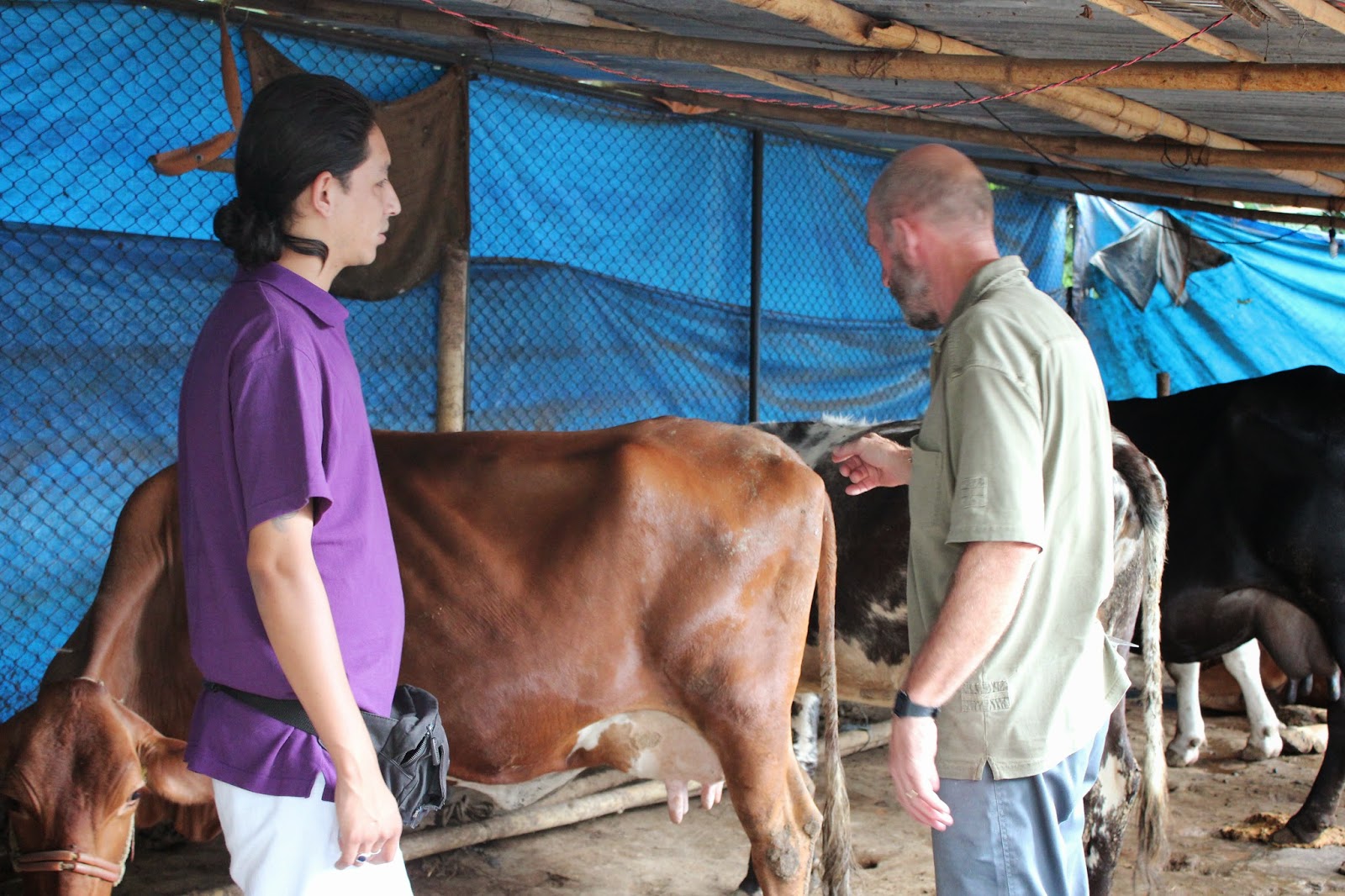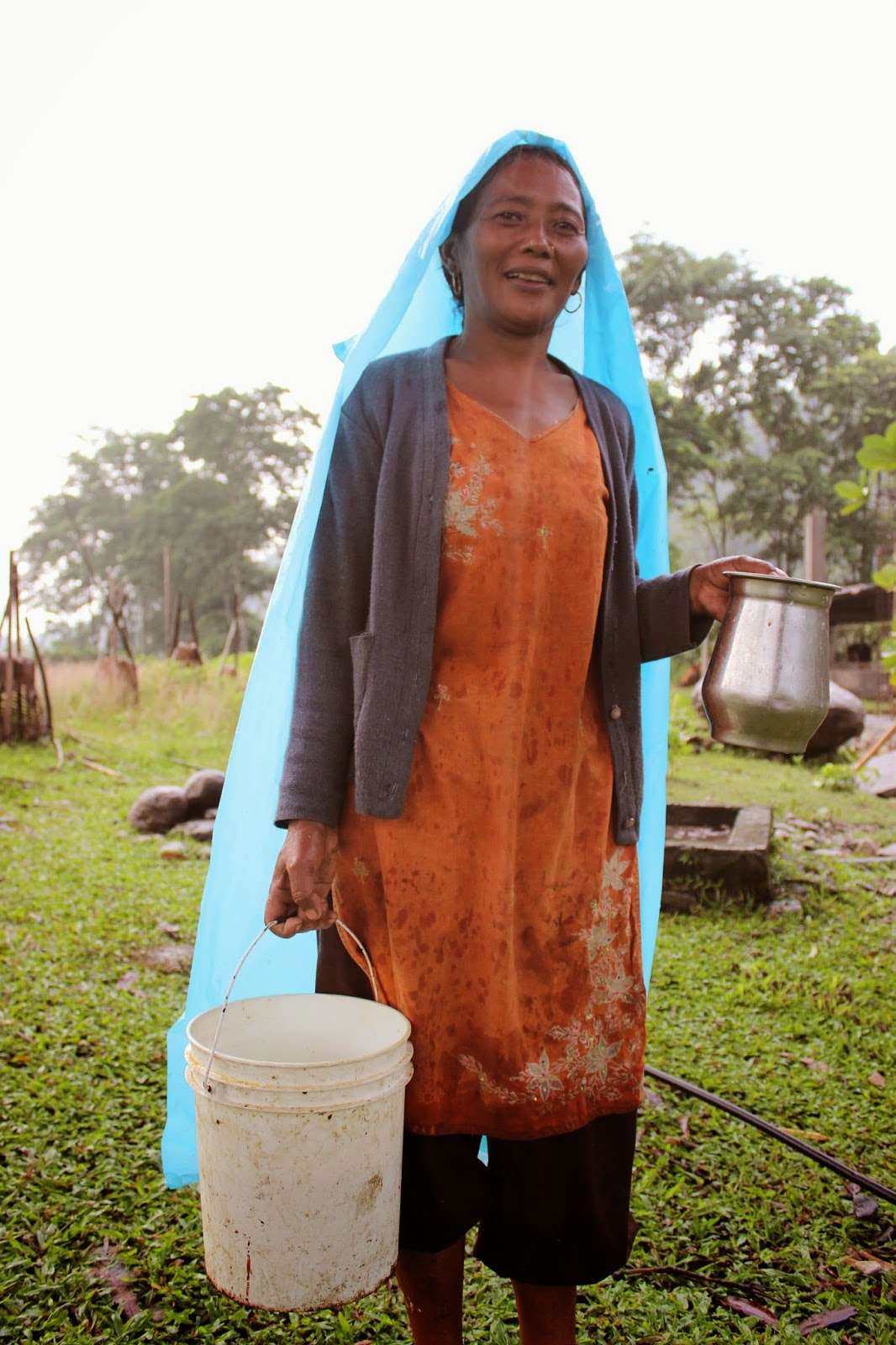Visiting dairy farms, advising Theki Dairy and Milkmandu,
city milk processors, writing budgets,
developing new cheeses and helping with VSO development programme proposals
have all been part of my experience since arriving here in Nepal, but now the
real work is to begin as meetings with my new Partners appear in the
diary. Krishna Olija, founder of Sarvodaya Shewashram, a locally funded organisation
that cares for the disabled elderly, runs a small dairy and promotes organic
farming, has been instrumental in finding my placement Partners. He has
arranged meetings and added the essential explanations of VSO’s work and the
role of the professional volunteer, that
my language skills could not attempt.
 |
| Krishna in full flow |
 |
| Cows at Nepal Pigeon Farm |
 |
| Explanations at Chobar Dairy Cooperative |
 |
| Simple workshops |
 |
| Developing 'Theki Maid' a local Nepali cheese |
My language skills, despite scoring pretty abysmally on the
final training oral assessment have been described by Shriva and Amrit, the
local bakers, as ‘sweet’. Needless to say other responses from locals can
include a blank stare or even laughter but I prefer these guy’s encouraging
remarks. In fact the ‘sweet’ description was also used by a bunch of girls I
met on a bridge, who were demanding I take their photo. At the time I was
using all my language skills to describe the dangers of too many on the bridge, whilst struggling to remember the plural of People!!!! (answer- mannchheharu)
 |
| A group of young women demand a photo, at festival time and put my language skills to the test. |
Back to Krishna who already has strong links with VSO Nepal
since he co-ordinates some of the activities of the ICS programme in our
District, Lamjung. Groups of young people from the UK visit the country and
work alongside National counterparts on district based projects. ICS in Nepal
is to being scaled up over the next few months and I am to have a small role in
the District induction programme where I will represent the work of the Secure
Livelihoods Programme.
 |
| Krishna signs up Sarvodaya Shewashram as a Partner |
 |
| A rainy day but the milking must go on. |
The Milijuli Agricultural Co-operative, itself the creation
of a business development programme, is a group of 441 women farmers who have
come together to share agricultural knowledge, facilitate training and create a
saving fund. Amongst their members are 100 beekeepers who produce a wonderfully
tasty product in there small collective processing facility. Their needs are
for ‘advanced beekeeping’ training which I hope to facilitate over coming
months. At our initial meeting when we received a warm welcome the usual
farming topics of discussion dominated proceedings. Before we finished and went
to visit a member who grew tomatoes and kept bees, the thorny subject of 'people migration'
reared its ugly head. It appears that 40% of their menfolk are working away
from home and of these half are abroad. The women identified diminished
household security, and a lack of male role models for the children of the
affected families, as some of the resulting difficulties. Strangely, work
burden was not raised as an issue since the co-operative approach allowed these
women to support each other and the remaining menfolk literally put their collective
elbows to the wheel.
 |
| Milijuli Co-op give us a traditional warm welcome. To my right is Khavaydo my VSO Programme Manager |
 |
| After the welcome and meeting some of the organic veg. is shown off. |
SOCOD Nepal is another NGO based in Lamjung whose work is
mainly in the fields of education, health and community support. Within the
eastern Lamjung district are some villages that have small herds of buffalos
producing ghee which is sold locally and Kathmandu. I have been asked to visit
them, along with an officer from the local District Livestock Services
Department, to fact find and discover where we can be of help.
Kisan Dairy is a collective of milk producers of varying
sizes. I have already visited one of the biggest and a group of the smallest.
They have identified needs of improving milk quality and quantity, technical
ability of the milk processing facility and business organisation improvements.
A fact finding schedule has been worked out and I visit milk collection centres
and the milk processing area later in the week. Sandeep , Nira and Sarun Rai are the young team who want to develop the business to the benefit of the farmer members.
 |
| Kisan Dairy's MD, Raj Kumar explains milk collection |
 |
| Then goes on to identify areas of 'need' |
 |
| Sarun Rai, Nira and Sandeep, some of the Kisan Dairy team |
Sustainability of transferred knowledge is the biggest
challenge. During my initial visits to farmers and processors we have
identified ‘needs’ and areas where ‘change’, would be welcomed. The struggle is
to make these changes long lasting and self- perpetuating. I will be working with the District Livestock
Service Office, based here in Besisahar. There are 4 livestock officers and Dr
Dhungana is the team leader, who has already expressed the dangers of giving
farmers conflicting advice. In an ideal world I will not be giving advice to
farmers. Instead I will be building the knowledge of his team of advisors,
anyone else giving advice in the district and farmers who are willing to share
knowledge with their neighbours. That’s the ideal world, but how can it be
done? No real answers. The solution will be built on many things which include friendship, trust, openness . Once these are in place let us hope the
knowledge will flow, in both directions. Another part of the foundation will be
good communication. I’m hoping that my Nepali speaking colleagues at VSO will
help to start things rolling but my own language skills will have to engender
more ‘sweet’ reactions and less laughter!

Congratulations!
ReplyDeleteNice to see your endeavour to transform farmers life through dairy and related interventions!
-Rameshwar
Congratulations!
ReplyDeleteNice to see your endeavour to transform farmers life through dairy and related interventions!
-Rameshwar